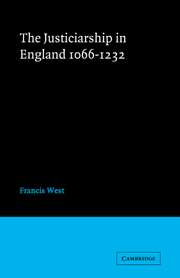Book contents
- Frontmatter
- Contents
- List of Abbreviations
- Introduction
- I THE ORIGINS OF THE JUSTICIARSHIP
- II THE JUSTICIARSHIP UNDER HENRY II
- III THE JUSTICIARSHIP UNDER RICHARD I
- IV THE JUSTICIARSHIP UNDER JOHN: BEFORE THE LOSS OF NORMANDY
- V THE JUSTICIARSHIP UNDER JOHN: AFTER THE LOSS OF NORMANDY
- VI THE JUSTICIARSHIP IN JOHN'S LAST YEARS
- VII THE JUSTICIARSHIP UNDER HENRY III
- Bibliography
- Index
VII - THE JUSTICIARSHIP UNDER HENRY III
Published online by Cambridge University Press: 08 January 2010
- Frontmatter
- Contents
- List of Abbreviations
- Introduction
- I THE ORIGINS OF THE JUSTICIARSHIP
- II THE JUSTICIARSHIP UNDER HENRY II
- III THE JUSTICIARSHIP UNDER RICHARD I
- IV THE JUSTICIARSHIP UNDER JOHN: BEFORE THE LOSS OF NORMANDY
- V THE JUSTICIARSHIP UNDER JOHN: AFTER THE LOSS OF NORMANDY
- VI THE JUSTICIARSHIP IN JOHN'S LAST YEARS
- VII THE JUSTICIARSHIP UNDER HENRY III
- Bibliography
- Index
Summary
When King John sealed Magna Carta at Runnymede, one of his supporters was the seneschal of Poitou, Hubert de Burgh, who was also one of the thirty-eight obsecutores et observatores, taking his place beside great magnates like William Marshal, earl of Pembroke, and the earls of Arundel and Warenne. The baronial host lingered at Runnymede until 25 June, by which date Hubert was styled justiciar; and twenty-four years later Lawrence of St Albans was to assert in his defence that Hubert was given the office there, in the presence of Stephen Langton, the earls of Warenne and Derby, and other magnates. The Great Charter mentioned the justiciar in several of its clauses and always as the king's deputy who would redress wrongs or take action if the king should be abroad. In a more general way it declared that justiciars, constables, sheriffs, and bailiffs should be men who knew the law of the kingdom and would observe it. Whoever was appointed justiciar would have to be a man trusted by the king to act as his alter ego, and competent as an administrator to do so, but he must also be a person whom the barons could trust, or, at the lowest estimate, tolerate.
HUBERT DE BURGH
Among the household officials of John when he was count of Mortain, Hubert, at least from 1198, was chamberlain. After John's accession Hubert's continued in office as chamberlain to the king of England. The new justiciar was peculiarly John's man in a sense in which Hubert Walter or Geoffrey fitz Peter was not.
- Type
- Chapter
- Information
- Justiceship England 1066–1232 , pp. 212 - 271Publisher: Cambridge University PressPrint publication year: 1966



